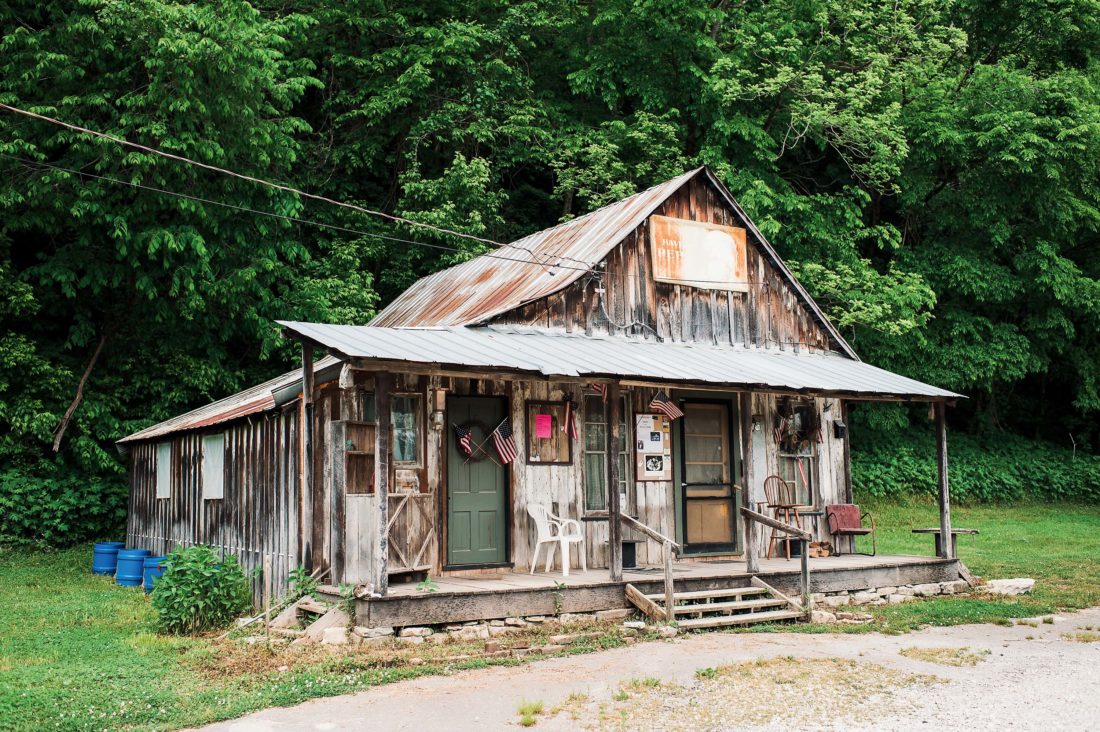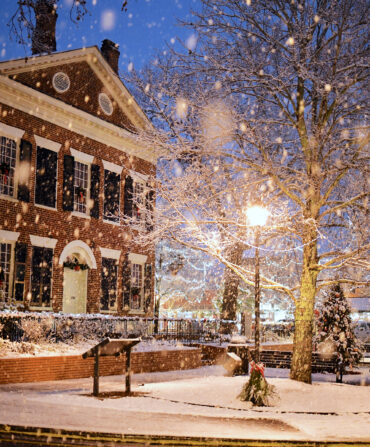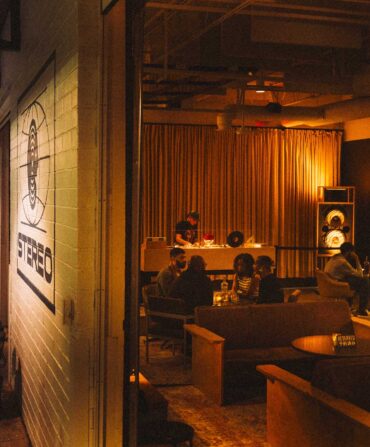I worked my way through college in the mid-1980s at a wholesale grocery in my hometown of Danville, Kentucky. The brick warehouses dated to the 1880s. The wooden floors were buckled with age, and holes were patched with tin cans cut into pieces and nailed to the floor. Work at Central Wholesale Grocery began at 4:00 a.m., and we’d roll huge iron-wheeled railroad carts down in the house to get up a load. Then we’d push them to the dock and load eighteen-foot box trucks and send them into the countryside to stock the little stores that used to be in every rural community or wide spot in the road—outposts such as Penn’s Store, in Gravel Switch, Kentucky, which remarkably continues to be a resonant place in my life today.
In my classes I was combing through Wordsworth’s “Tintern Abbey” or reading Flannery O’Connor. At Central I was getting a different education, one that would more directly influence my work as a poet than anything I encountered formally. Some of the men had only finished grade school, some were semiliterate, but there was a particular language spoken in that place, and I loved it. The humor of the banter and the rhythms in the air often left me marveling at what could be done with the English language. The foreman, Mr. Oliver, barked and bayed like an auctioneer as he called off items to go into the truck. “I need a case of three-roll barking dog.” Translation: Load a box of three two-and-a-half-foot rolls of bologna wrapped in casing, and call out the weight as you carry it into the truck. (Incidentally, Shakespeare would have liked that sentence; it’s perfect iambic pentameter: i NEED a CASE of THREE-roll BARKing DOG.)
Many of the men had names that could have sprung from a book—Red, Squirrel One and Squirrel Two (both of whom were actually Randy), Tight, Turrell, and Chicago. One truck driver went by Whit. I started calling him Walt Whitman. Charlie’s Office was the not terribly private bathroom. I was known as College Boy and was often teased by others, who wondered what I was learning reading all those books. I sometimes wondered, too.
In the attic of the main warehouse were old ledgers
and scales and tools. One day I peeked through a ledger and found my great-grandfather’s name, C. V. Price. I asked my grandmother about this and learned that Pop had worked for Central Wholesale Grocery during the Depression. He started out as a salesman, taking orders from the country stores, sometimes on horseback. As the Depression wore on, he graduated to warehouseman, and then to nothing. “That Depression just kept coming,” she said.
My life has had an uncanny number of full-circle experiences. That I worked at the same warehouse as my great-grandfather is one of them. That I live today a few miles from Penn’s Store is another. Penn’s first opened in 1845 and is the oldest country store in America continuously owned and operated by the same family. A one-room low frame building with a stovepipe sticking through the roof, it sits below a tall knob in a bottomland made by the north fork of the Rolling Fork River. It looks like an old hat sitting in a field.
When I was growing up, we used to go swimming in “the fork,” and we’d stop by Penn’s for a Dr Pepper and a bologna sandwich. The store was a gathering spot for everyone in the Forkland community, the place where neighbors shared news and told stories and the past was never gone. Gossip and jokes went around, but I also think a kind of wisdom the community held in common had the chance to be expressed and savored. In the old days many families bought their groceries on credit, until they harvested the fall crops. You could buy a can of soup and a sleeve of soda crackers. A jar of pickled eggs sat on the counter. You could get a twist of tobacco. The store was operated by Haskell “Hack” Penn, and I distinctly remember his fingernails. They were longish and thick and not especially clean. One could have gotten squeamish watching him slice a hunk of bologna from the long roll and then slather Miracle Whip onto both slices of white bread. He wore bib overalls, and a great cheer leaped in his gray-blue eyes.
After Hack died in the early 1990s at age eighty-four, his niece Jeanne Penn Lane wanted to do something with the store, which by that time was not much of a going concern. She realized it had never had an outhouse, so she devised a local competition. Teams of participants would design and build an outhouse on wheels and push and pull their models in a race. The winner got the honor of being the store’s inaugural outhouse. I happened to attend the first Great Outhouse Blowout, on a chilly fall afternoon in 1992. Afterward, Chet Atkins took the stage, or rather, a hay wagon in the middle of the field, and did all kinds of chicken pickin’ on his fancy guitar. Jeanne, turns out, had spent time in Nashville as a songwriter. Clearly, she had connections.
The Blowout was an annual event until Jeanne’s death, in 2018. She had also organized the Kentucky Writer’s Day Celebration at the store, still held each spring and now named in Jeanne’s memory. I’ve been flattered to participate in this event for well over ten years. Last spring I read poems and played guitar. A litter of kittens periodically poured out from under the porch. Dawn Osborne, one of Jeanne’s daughters, and in the sixth generation of the family to operate Penn’s, played and sang. The storytelling and the music went on until dark. Dawn told me recently, “Mother always said all of the problems of the world could be solved at Penn’s Store.”
In the years that I’ve been writing poems, I’ve often lamented that much of the world I write about is either gone already or on its way to becoming history. When I worked at Central Wholesale Grocery, we supplied more than two hundred country stores. Almost all of them are now gone, and Central has been closed for over twenty years.
A glance at history tells us that a common feature of the American character is to move on to the next thing, the next way of being in the world, whether it’s good for us and our communities or not. The English language itself is always changing; in fact, it requires change because it’s a living resource we share. I was just lucky in my younger days to hear the language spoken in a particular place by particular people who could play it like an instrument. But the loss of the country stores is a loss to the communities they served. Where I live, rural communities seem less cohesive; people seem less connected.
That is why I treasure what happens at Penn’s, a shared effort of continuity and community. Although the store isn’t open every day now, along with hosting occasional events Dawn regularly opens it on Sunday afternoons. Now and then local musicians show up and a picking party ensues. A woodstove sits in the middle of the room, surrounded by ladder-back chairs. Wooden counters run along both sides and the back. A string of painted gourds hangs from the beadboard ceiling, alongside a calendar from 1978 and a broadside of a poem by the Dalai Lama called “Never Give Up.” If you want to make a purchase, here’s some of what you can get: soft drinks, Nabs, hard candy, cigarettes, headache powder, soup beans, soap, an oil lamp wick, molasses, and a bottle of witch hazel.
As I often do, I stopped by Penn’s recently to take in the conversation. A couple who were traveling on motorcycles had pulled up and were talking about bringing lambs and calves into their kitchen for bottle feeding in cold weather. Bob Gorley, a local, and Dawn were going over who was related to whom and how. Darethea and Bill Burns popped in, “because we didn’t have anything else to do.” When Lee Dixon walked in, Dawn asked him how he’d been. “Every little thing just got better,” he said. “Because I’m here!”
Dawn told me that in the last few months, she’d had people stop by from California, Texas, Oklahoma, New York, Puerto Rico, and all around Kentucky. “And they stay, and they stay, talking about memories of days gone by,” she said. “It’s almost as if they are making a pilgrimage that they don’t even realize they are making.”
You can’t get a bologna sandwich anymore, but you can get something else at Penn’s—a place to be with neighbors and friends, to hear a tale or a song and watch the night climb up the hill, and that’s more nourishing than a cold bologna sandwich. It sticks to a metaphorical rib and leaves you feeling fed.








